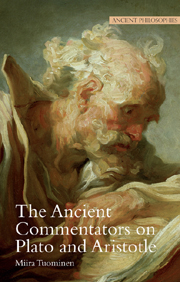8 - Conclusion
Summary
We have now followed the outline of the commentators' curriculum and proceeded from themes in epistemology, logic and natural philosophy to the questions concerning the nature and structure of reality and the content and conditions of a happy human life. We have seen that the ancient commentaries are a rich source of arguments and developments in, sometimes also revisions and criticism of, the Platonic–Aristotelian tradition. Let us now consider the most significant systematic outcomes of our discussion.
One important strand that runs through the Platonic–Aristotelian tradition as we encounter it in the commentators consists in the assumption that reality is intelligible and knowable for human beings. This idea has consequences for the analysis of both human cognitive capacities and reality, and also links these two in a specific manner. In general, there are two kinds of objects of cognition related to our basic cognitive capacities: we perceive what is perceptible and can intellectually grasp what is intelligible. These aspects of reality are in a hierarchical relation to each other such that the intelligible is higher than the perceptible. An influential assumption formulated by Aristotle (which he attributes to Plato as well) is that the human cognitive development proceeds in the reverse order. We first come to know what is perceptible and proceed towards the intelligible.
Philoponus and Themistius follow Plato and Aristotle in arguing for the existence of principles and against the possibility of infinite knowledge claims (Chapter 2).
- Type
- Chapter
- Information
- The Ancient Commentators of Plato and Aristotle , pp. 280 - 287Publisher: Acumen PublishingPrint publication year: 2009



